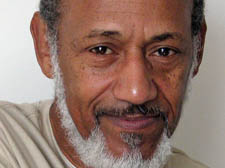|
|
 |
| |
 Wilfred Fraser Wilfred Fraser |
‘A writer’s life for me – even if it takes a lifetime’
Wilfred Fraser arrived in London from Grenada as a young man with dreams of a literary career, but it was a long time coming, writes Angela Cobbinah
The Brotherhood of the Unicorn.
By Wilfred Fraser
Hibiscus Publishing. Amazon.co.uk
WILFRED Fraser recites the first verse of the 19th-century ballad “Bingen on the Rhine”, his eyes brimming with emotion. He first heard it as a 15-year-old in 1940s Grenada while undergoing the rigours of a colonial education and remembers how it cemented the idea of becoming a writer in his mind.
“It was a dying soldier’s lament and my teacher had given it to me to learn as my weekend homework,” he recalls wistfully.
“I remember being half-hearted about it because I thought poetry was only for girls. But when I read the poem it really captured my imagination. It had everything in it – adventure, love, emotion – and I knew then, more than anything else, that I wanted to become a writer.”
But already his head was full of stories that he had heard while growing up in Sauteurs, a small town in the north of the Caribbean island where most people lived without the benefit of the electric light or radio. “As kids we used to gather under the gas lamps or moonlight to listen to tales told by the older men and women,” he says. “That’s what gave me the story-telling bug.”
Fraser, the 10th of 11 children, trained to become a primary school teacher. Then, like many others of his generation, he boarded the boat for London, hoping that it would increase his chances of pursuing a literary career. It was 1957 and he was two months short of his 22nd birthday.
“I did achieve my dream but it took a lot longer than I expected,” he says wryly, picking up a well-thumbed copy of debut novel, The Brotherhood of the Unicorn, which he wrote after he retired from Mount Pleasant Sorting Office in Clerkenwell.
A rites-of-passage story based on his own childhood, it is a warm evocation of life in post-war Grenada where “everyone was connected to each other”.
When the book was launched on the island two years ago it caused a sensation. “It was more successful than I could have ever hoped. People kept coming up to me asking, ‘am I in it, am I in it?’,” he laughs.
Aged 73 but walking with a real spring in his step, he is working on his second novel, viewing his late entry into the literary world philosophically. “Life just got in the way,” he muses.
When he arrived in London more than 50 years ago, he headed for Kentish Town where many members of the Fraser clan had already settled in the Queen’s Crescent area.
Homesick and taken aback by the hostile attitude of some of the natives, he also remembers his delight in the strangeness of being in a foreign land.
“I lived in house that only had an outside toilet and the first time I saw snow was when I had to pop out to it one night. It was a fantastic sight, a sea of endless white, and I stood there staring at it for so long that I was almost frozen myself.”
Having been turned down as a bus conductor because he was “too tall”, he got a job in Buttle’s wood yard, not far from where he lived in Marsden Street. Two evenings a week he would make his way down to the Working Men’s College in Mornington Crescent to study English literature. But he had to give it up after a year once the first of his six children arrived.
“I saw the course as increasing my chances of becoming a writer but once I had started a family I had to substitute college for overtime,” he says.
By this time he had found a job at Mount Pleasant, where he was to spend the next 33 years. But even as the demands of life took over, he never quite abandoned his dreams. “I used to go to this pub in Hampstead where writers used to meet up. I liked to listen to them chat and to look through the pieces work they had pinned on to the notice board. Then I would go home, take out my shoebox and read my own efforts. Unfortunately, the pub was nicknamed ‘the failed writers society’,” he chuckles.
Much later, faced with the “endless days” of retirement, he enrolled on a number of courses at Hackney Community College, near where he now lives, including computing and English literature. When he joined a creative writing class a year later, the words poured out of him as he sat down to write his first book. “The novel had always been in my head – I even had a title for it.”
Snapped up by new publishing outfit Hibiscus, it was unveiled in Sauteurs, as well as in the sister island of Carriacou and the capital St George’s before its UK launch at the Hackney Empire.
Now a frequent speaker at schools, day centres and colleges, Wilfred can’t quite believe his luck. “I really have had quite an amazing journey and sometimes I have to pinch myself to see if it is all true,” he says, beaming broadly.
“Retirement for me was not an end but a new beginning.”
|
 |
|
|
 |
 |
|
 |
|
 Wilfred Fraser
Wilfred Fraser
